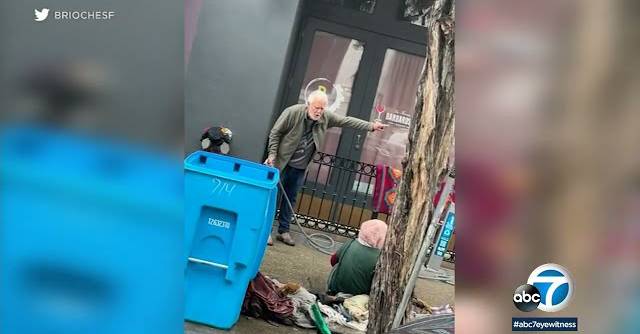
A San Francisco art gallery owner faces charges after he was seen in a video spraying a homeless woman with a hose on Monday, Jan. 9, 2023. (Screenshot from ABC7)
A San Francisco art gallery owner caught on camera spraying a homeless woman with a hose outside his gallery last week faces a battery charge in the case, prosecutors said.
Collier Gwin, 71, faces a misdemeanor battery charge for the incident caught on camera on Jan. 9, prosecutors said. He is expected to be in court on Feb. 17.
“The alleged battery of an unhoused member of our community is completely unacceptable,” said San Francisco District Attorney Brooke Jenkins in a statement. “Mr. Gwin will face appropriate consequences for his actions.”
In the video, Gwin is spraying a hose on a woman sitting on a sidewalk outside the gallery.
The voicemail box at the Foster Gwin art gallery was full on Thursday. But in an interview Jan. 10 on KABC, Gwin spoke out about the incident.
“I understand what an awful thing that is to do, but I also understand what an awful thing it is to leave her on the streets,” he said.
(Actor Alec Baldwin Will Face Criminal Charges Over Deadly Shooting on Set of ‘Rust’)
The police had been repeatedly called to get help for the woman, he said.
“There must be 25 calls on record … spent two days at a homeless shelter, two days in jail, and then they drop them back on the street,” he said.
He spoke again on Wednesday with the station.
“I am deeply apologetic and abhorred when I watch the video,” he said.
San Francisco police said the drama began when they responded to a report of a possible assault about noon in the 700 block of Montgomery Street. When they arrived, police found Gwin and a woman in a dispute. Both parties declined further police action, officials said.
The San Francisco Street Crisis Response Team responded and provided service options to the victim, officials said. A police report was taken and investigators took over the case.
Police did not provide further details about the number of responses that Gwin talked about nor how the calls were handled.
The Reverend Amos Brown, the president of the local chapter of the NAACP, doesn’t think Gwin should be charged criminally. In an interview with the Bay Area CBS affiliate, KPIX, on Thursday, Brown said Gwin apologized to him and he accepted it.
He believes the city of San Francisco should take the blame for this case escalating.
“I think that this city has been negligent, has played too much politics around this issue of the unhoused,” he said.
In September, the Coalition on Homelessness and others filed a lawsuit against the City and County of San Francisco and Mayor London Breed alleging “efforts to criminalize homelessness through an array of brutal policing practices that violate the constitutional rights of unhoused San Franciscans,” the ACLU of Northern California said.
They sought an emergency injunction to stop the practices.
“For years, San Francisco has claimed that it is taking steps to address the City’s homelessness crisis,” the ACLU said. “But in fact, the City is forcing unhoused people out of sight—destroying their survival belongings and citing and arresting them for sleeping in public when they have no shelter to go to. San Francisco has more laws penalizing homelessness than any other place in California, and possibly America.”
In a statement Thursday, Breed addressed the Gwin case.
“I understand people may have frustrations with situations that occur on our streets, but that is not an excuse for treating another person as less than human,” she said. “This is also another example of why we need changes to our state mental health laws. There are too many people struggling in our city who cannot help themselves and we need more tools to get them off the streets and into care.”
Have a tip we should know? [email protected]